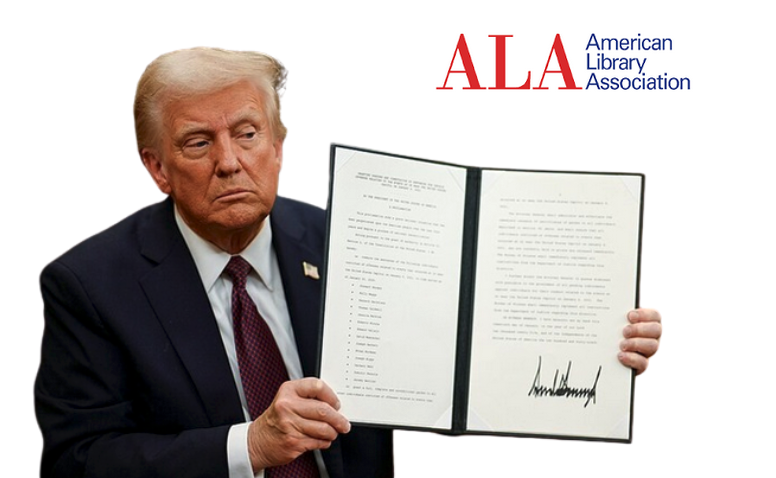Trump Administration Responds to ALA's Lawsuit to Save IMLS
In a lengthy filing, DOJ lawyers argue that the canceling of grants and the firing of staff at IMLS is not about dismantling the agency, but about realigning it consistent with the current administration’s policy objectives.

Destroying the IMLS? Who? Us? In a lengthy 59-page opposition brief filed on April 21, DOJ lawyers suggested that the Trump administration is not dismantling the Institute of Museum and Library Services, the agency in charge of dispensing virtually all federal funding for libraries, and urged a federal court to deny a motion by the American Library Association that seeks to restore the jobs and grants summarily terminated in the wake of a March 14 Trump executive order.
Following the legal script in a similar legal action playing out in federal court in Rhode Island, DOJ lawyers argue that the ALA lacks standing to pursue their claims in federal court. As in the Rhode Island case, which was brought earlier this month by 21 state attorneys general, the DOJ argues that any action over the mass firing of IMLS staff should be heard before “administrative bodies” established by the Congress via Civil Service Reform Act, and that any disputes over canceled grants are in fact contract disputes, which should be heard before the Federal Court of Claims.
“Plaintiffs’ proposed injunctive framework aims to restore terminated grants, ensure that no additional grants are terminated, and to re-instate IMLS personnel to process those grants,” the DOJ’s ALA brief states. “In other words, Plaintiffs want the Government to keep paying up. As such, jurisdiction for Plaintiffs’ claims related to those grant agreements lies exclusively in the Court of Federal Claims.”
As they did in the Rhode Island case, DOJ lawyers also point out that Congress “did not make specific line-item appropriations to IMLS; it made a lump-sum appropriation.” Thus, the brief suggests, IMLS retains the right to change its mind as to how its money is spent.
“Fundamentally, Plaintiffs are not funded through direct congressional appropriations, rather, they are explicitly funded through grant agreements with IMLS,” the DOJ brief states. “Execution of those grant agreements—and their terminations—are governed by the applicable grant agreements. Defendants’ conduct under those grant agreements may be reviewable—as Defendants argue, in the Court of Federal Claims—but the mere fact that a grant agreement is funded through an appropriation does not mean that the routine execution of that grant agreement takes on statutory—let alone constitutional—dimensions.”
The filing comes after the ALA filed suit on April 7 in federal court in Washington D.C., joined by AFSCME/AFL-CIO as co-plaintiffs, seeking to block the Trump administration’s bid to effectively destroy the IMLS. The suit argues that Trump’s March 14 executive order and subsequent actions taken by acting director Keith Sonderling to comply with that order—which includes the canceling of grants and laying off 85% of staff—runs afoul of “Congress’s appropriations authority, the separation of powers,” and violates the Administrative Procedure Act by acting “contrary to law, and arbitrarily and capriciously.”
Closure? What Closure?
Notably, throughout the filing, DOJ lawyers seek to blunt the ALA’s claims by arguing that the IMLS isn’t really being shut down, but is in the midst of a “re-structuring.”
While no plan for the IMLS has been released publicly, the DOJ cites a statement made by Deputy Secretary of Labor Keith E. Sonderling, who was installed as IMLS Acting Director last month, in which he vowed to “revitalize IMLS and restore a focus on patriotism,” and to steer IMLS “in lockstep” with the Trump Administration’s goals.
“Plaintiff ALA states that ‘its IMLS grants were terminated, effective April 8,’ it speculates that ‘[m]ore grant terminations are certain to follow’ and that ‘without staff to disburse grant funds or process and administer claims for reimbursement, grantees will not receive their grant funds, and grantees who have already expended funds in reliance on their awards will be unable to receive reimbursements,’” the filing acknowledges. But those assertions “fall far short of the concrete ‘certainly impending’ harms” required for the ALA’s motion to succeed, the DOJ insists.
“While some programs and grants have been terminated, others remain in place,” DOJ lawyers point out. “This is a reduction, but a far cry from the wholesale ‘shutdown’ Plaintiffs fear.”
The filing even suggests that the mass termination of the IMLS’s statutorily mandated advisory board is only temporary. “Plaintiff is correct that existing board members were terminated on April 3, but there is no impediment to the appointment of new board members,” the DOJ argues. “There remains ample time in the current year for new board members to be appointed, and for them to hold two or more meetings as required under the statute.”
Furthermore, as they did in Rhode Island, DOJ lawyers argue that the APA requires challenges to pertain to “final” actions, while the recent staff reductions and grant terminations at IMLS, they suggest, are merely the beginning of a process.
“IMLS’s ongoing implementation of the Executive Order marks the initiation, not the consummation, of the agency’s decision-making process. IMLS’s actions reflect decisions by agency leadership to realign their policy goals and actions consistent with the current administration’s directives,” DOJ lawyers argue. “Accordingly, Plaintiffs are unlikely to succeed on their APA claims because they are sweeping programmatic challenges and thus not cognizable under the APA.”
While “individual final agency actions may be reviewable,” DOJ lawyers concede, the APA does not permit “wholesale challenges.”
In the filing, DOJ lawyers also reject the constitutional claims made by the ALA.
“Plaintiffs do not allege viable constitutional claims merely by invoking the Spending Clause and the Appropriations Clause. Neither of these constitutional provisions—or even the appropriations statutes that Congress passed pursuant to its Article I powers—requires that IMLS continue to fund Plaintiffs through now-terminated grant Agreements,” the DOJ brief argues. “Consistent with the President’s directive, IMLS determined that the grants were ‘no longer consistent with the agency’s priorities and no longer serves the interest of the United States and the IMLS Program.’ It is axiomatic that the President may take such decisions as to Executive Branch agencies.”
In addition, DOJ lawyers dismissed the ALA’s claim under the Take Care Clause. “It should be noted at the outset that the Government is not aware of any case that has ever held that the Take Care Clause can be used as a mechanism to obtain affirmative relief,” the DOJ brief states. “Through the Take Care Clause, the Constitution vests the President with broad, discretionary authority to ‘take Care that the Laws be faithfully executed’ … But no court has read the Take Care Clause as opening the door to any plaintiff seeking to challenge the way the President executes Congress’s laws.”
The ALA is now set to file a reply to the DOJ’s brief by April 28, and a hearing before judge Richard Leon is set for April 30. In its motion, the ALA asked the court for a ruling by May 4, which is reportedly the date on which the "mass termination of IMLS staff" is set to take effect.
On that front, the ALA could get some help. Judge John J. McConnell in Rhode Island heard oral arguments on Friday, April 18 in the state's case, and could rule any day now.


